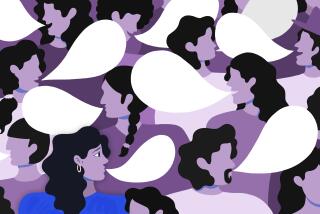TV REVIEW : PBS Series Has a Few Things to Say About ‘Language’
- Share via
Is language, in its written and spoken forms, the key to human uniqueness? Is it the crucial clue pointing to our evolutionary heritage? Is it the dominant factor that links every group of people in the world, despite other superficial differences?
Writer-producer-director Gene Searchinger’s three-part PBS series, “The Human Language,” says absolutely, positively, indubitably--and any other “yes” word you can think of for a program obsessed with words and with the sentences and ideas constructed from them.
But Searchinger is just as obsessed with making the science of linguistics enjoyable, so he fills his series with a kind of “Sesame Street” softness, turning his inquiry into a kind of comfy intellectual pillow for adults and teens to lay their heads on. This is cute science, co-starring Noam Chomsky and Sid Caesar (among many, many others).
At the same time, this reportedly marks linguist extraordinaire Chomsky’s first TV appearance explaining his revolutionary theory that we are born with language ability in the same way we’re born to walk; the complexities of language, which far outstrip those of other skills we struggle to learn, seem to be hard-wired into our brain.
Despite celebrity drop-ins such as George Carlin and Shari Lewis, Chomsky is the star here, and the series’ three episodes explore various aspects of his revolution. Tonight opens with the nearly unanswerable question: What is a word? and goes on in amusingly jaunty fashion to explore how we distinguish, without being taught, sense from nonsensical statements.
The key is that we’re born with the notion of concepts--an idea as old as Plato but refined by Chomsky. Episode two looks at how children immediately grab hold of syntax and run with it, long before they can run. Searchinger giddily blends shots of adorable kids talking kid-talk (one says “jamamas” instead of “pajamas”) with a running debate among linguists over how much language ability kids imitate from their environment and how much they’re born with.
The idea of a universal grammar, transcending dialects and language groups, becomes the basis in the final episode as a sign of our evolution from apehood. New Guinea tribespeople converse in a syntax not so different from that heard in a Paris bistro or a kindergarten classroom--proof, says researcher Paul Ekman, of a shared human heritage. So are our nonverbal gestures and a larynx that allows us to make vowel and consonant sounds no other animal can.
The message--that we are each a carrier of an ancient biology most beautifully expressed in language--is wrapped by Searchinger in the kind of bubbly, science-can-be-fun package that PBS originally cut its teeth on.
* “The Human Language” airs at 10 tonight on KCET-TV Channel 28, and at 8 p.m. on KVCR-TV Channel 24. Parts two and three air Feb. 17 and 24.
More to Read
The complete guide to home viewing
Get Screen Gab for everything about the TV shows and streaming movies everyone’s talking about.
You may occasionally receive promotional content from the Los Angeles Times.






